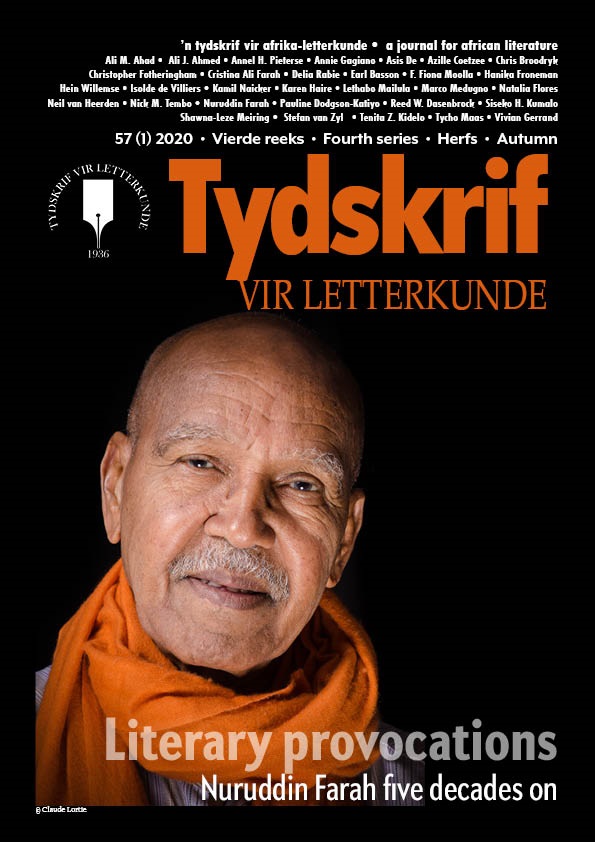Trajectories of radicalization and resilience in Nuruddin Farah’s North of Dawn
DOI:
https://doi.org/10.17159/2309-9070/tvl.v.57i1.8080Keywords:
radicalization to violent extremism, resilience, Nuruddin Farah, belonging, conviviality, fascismAbstract
Situated within a body of writing that is preoccupied with engagement with terrorism, this article considers the ways in which Nuruddin Farah’s novel, North of Dawn (2018), explores trajectories of radicalisation and resilience to violent extremism. Written from an interdisciplinary cultural migration studies perspective, the article understands violent extremism as a complex networked phenomenon. It makes an original contribution by highlighting the role of belonging in trajectories of radicalisation and resilience, bringing sociological studies of radicalised violence and resilience to such violence into dialogue with a cosmopolitan literary framework including the works of other diasporic Somali background European writers such as Cristina Ali Farah and Igiaba Scego.
Downloads
Metrics
References
Aden, Kaha Mohamed. Fra-Intendimenti. Nottetempo, 2010.
Amin, Ash. Land of Strangers. Polity, 2012.
Arts House. “The Believers Are But Brothers: Javaad Alipoor & Kirsty Housley [Performance].”Arts House, www.artshouse.com.au/events/the-believers-are-but-brothers/. Attended 24 May 2019.
Barelle, Kate. “Pro-integration: disengagement from and life after extremism.” Behavioural Sciences of Terrorism and Political Aggression vol. 7, no. 2, 2014, pp. 129–42. DOI: https://doi.org/10.1080/19434472.2014.988165.
Bauman, Zygmunt. Retrotopia. Wiley, 2017.
Berger, John M. “Extremist Construction of Identity: How Escalating Demands for Legitimacy Shape and Define In-Group and Out-Group Dynamics.” International Centre for Counter Terrorism—The Hague no. 7, 2017, pp.1–68. DOI: https://doi.org/10.19165/2017.1.07.
Carroli, Piera, and Vivian Gerrand. “La mia casa è dove sono: Subjects and narratives beyond national borders.” Scritture migranti, no. 5, 2011, pp. 81–104.
Cottee, Simon. “Jihadism as a subcultural response to social strain: Extending Marc Sageman’s ‘Bunch of Guys’ Thesis.” Terrorism and Political Violence vol. 23, no. 5, 2011, pp. 730–51. DOI: https://doi.org/10.1080/09546553.2011.611840.
Fabricius, Peter. “Op-Ed: Fighting Extremism while keeping democracy alive.” Daily Maverick. 13 Nov. 2016. www.dailymaverick.co.za/article/2016-11-13-op-ed-fighting-extremism-while-keepingdemocracyalive/. Accessed 3 Jun. 2019
Fangen, Katrine. “Humiliation Experienced by Somali Refugees in Norway.” Journal of Refugee Studies vol. 19, no. 1, 2006, pp. 69–93. DOI: https://doi.org/10.1093/jrs/fej001.
Farah, Nuruddin. North of Dawn. Riverhead, 2018.
Galloway, Chris. “Media jihad: What PR can learn in Islamic State’s public relations masterclass.” Public Relations Review vol. 42, no. 4, 2016, pp. 582–90. DOI: https://doi.org/10.1016/j.pubrev.2016.03.014.
Gerrand, Vivian. “Mending Mogadishu. Somali Belonging in the twenty-first century.” Arena Magazine, Dec. 2015–Jan. 2016, pp. 22–5.
Gerrand, Vivian. Possible Spaces of Somali Belonging. Melbourne U P, 2016.
Gerrand, Vivian. “Representing Somali Resettlement in Italy: The Writing of Ubax Cristina Ali Farah and Igiaba Scego.” Italian Studies in Southern Africa vol. 21, nos. 1–2, 2008, pp. 270–95. DOI: https://doi.org/10.4314/issa.v21i1-2.43970.
Gerrand, Vivian & Michele Grossman. Interviewing the Families of Young People who have Joined or Attempted to Join Violent Conflict [Report]. Alfred Deakin Institute for Citizenship and Globalization, Deakin U, 2017.
Glick Schiller, Nina. “Diasporic Cosmopolitanism: Migrants, Sociabilities and City Making.” Whose Cosmopolitanism? Critical Perspectives, Rationalities and Discontents, edited by Nina Glick Schiller and Andrew Irving, Berghahn, 2015, pp. 103–20.
Grossman, Michele & Hussein Tahiri. Harnessing Resilience Capital: An Investigation of Resilience And Cultural Diversity in Countering Violent Extremism. Victoria U P, 2013.
Grossman, Michele et al. Understanding Youth Resilience to Violent Extremism: A Standardised Research Measure: Final Research Report. Alfred Deakin Institute for Citizenship and Globalization, Deakin U, 2017.
Hickman, Mary J. et al. “Social cohesion and the notion of ‘suspect communities’: a study of the experiences and impacts of being ‘suspect’ for Irish communities and Muslim communities in Britain.” Critical Studies on Terrorism vol. 5, no. 1, 2012, pp. 89–106. DOI: https://doi.org/10.1080/17539153.2012.659915.
Isakhan, Benjamin. Heritage Destruction and Spikes in Violence: The Case of Iraq. Brill, 2013.
Joosse, Paul et al. “Narratives and Counter-narratives: Somali-Canadians on Recruitment as Foreign Fighters to Al-Shabaab.” British Journal of Criminology vol. 55, no. 8, 2015, pp. 811–32. DOI: https://doi.org/10.1093/bjc/azu103.
Knott, Kim, Ben Lee & Simon Copeland. Reciprocal Radicalization [Report]. CREST, 2018.
Khosrokhavar, Farhad. Suicide Bombers: Allah’s New Martyrs. Pluto, 2005.
Moolla, F. Fiona. “Postnational Paradoxes: Nuruddin Farah’s Recent Novels and Two Life Narratives in Counterpoint.” Research in African Literatures vol. 49, no. 1, 2018, pp. 68–83. DOI: https://doi.org/10.2979/reseafrilite.49.1.05.
Nilsson, Marco. “Foreign Fighters and the Radicalization of Local Jihad: Interview Evidence from Swedish Jihadists.” Studies in Conflict and Terrorism vol. 38, no. 5, 2015, pp. 343–58. DOI: https://doi.org/10.1080/1057610x.2015.1005459.
Pucherova, Dobrota. “Islam, Tradition and Modernity in the Work of Two Somali Writers: Nuruddin Farah and Ayaan Hirsi Ali.” English Studies in Africa vol. 59, no. 2, 2016, pp. 27–40. DOI: https://doi.org/10.1080/00138398.2016.1239416.
Ranstorp, Magnus, ed. Understanding Violent Radicalization. Terrorist and Jihadist Movements in Europe. Routledge, 2010.
Sheikh, Mustapha & Tajul Islam. “Islam, Alcohol, and Identity: Towards a Critical Muslim Studies Approach.” ReOrient vol. 3, no. 2, 2018, pp. 185–211. DOI: https://doi.org/10.13169/reorient.3.2.0185.
Sweid, Reem. “Tony Abbott Reinforces White Supremacists.” Illawara Mercury. 10 Dec. 2015, www.illawarramercury.com.au/story/3551875/tony-abbott-reinforces-white-supremacists/. Accessed 3 Sep. 2019.
Tellander, Ebba & Cynthia Horst. “A Foreign Policy Actor of Importance? The Role of the Somali Diaspora in Shaping Norwegian Policy towards Somalia.” Foreign Policy Analysis vol. 15, no, 1, 2019, pp. 136–54. DOI: https://doi.org/10.1093/fpa/orx012.
Thomas, Paul. Responding to the Threat of Violent Extremism: Failing to Prevent. Bloomsbury, 2012.
Weine, Steven & Osman Ahmed. Building Resilience to Violent Extremism among Somali-Americans in Minneapolis-St. Paul: Final Report to Human Factors/Behavioral Sciences Devision, Science and Technology Directorate. U. S. Department of Homeland Security, 2012.
Wignell, Peter, et al. “Violent extremism and iconisation: commanding good and forbidding evil?” Critical Discourse Studies vol. 14, no. 1, 2017, pp. 10–22. DOI: https://doi.org/10.1080/17405904.2016.1250652.
Downloads
Published
How to Cite
Issue
Section
License
Copyright (c) 2020 Tydskrif vir Letterkunde

This work is licensed under a Creative Commons Attribution-ShareAlike 4.0 International License.


 https://orcid.org/0000-0001-6465-6584
https://orcid.org/0000-0001-6465-6584


.png)